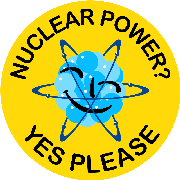.

-
Recent Posts
Recent Comments
- Eric Schmitz on Senator Warren Seeks Input on Climate Change
- Stephen Williams on Senator Warren Seeks Input on Climate Change
- Eric Schmitz on Yellow Journalism from a “Green” Source
- James Greenidge on Yellow Journalism from a “Green” Source
- James Greenidge on When Should Nuclear Power Plants Die? – Forbes
Books and Media
Blogroll
- ANS Nuclear Cafe – American Nuclear Society
- Atomic Insights – Rod Adams
- Atomic Power Review – Will Davis
- Brave New Climate – Barry Brook
- Breakthrough Institute – Schellenberger & Nordhaus
- Canadian Energy Issues – Steve Aplin
- Deregulate the Atom – Rick Maltese
- Environmentalists for Nuclear Energy (USA)
- Hiroshima Syndrome – Leslie Corrice
- Left Atomics – David Walters
- NEI Nuclear Notes – Nuclear Energy Institute
- Nuclear Green Revolution – Charles Barton
- Nuclear Power? Yes please!
- Prescription for the Planet – Tom Blees
- Science Council for Global Initiatives
- Scientists for Accurate Radiation Information
- Things Worse Than Nuclear Power
- Yes Vermont Yankee – Meredith Angwin
Archives
Categories
Meta
Bringing American Progressives on board for a clean nuclear future
Indiana SB 309, the “Kill Net Metering” Bill
On 16 February 2017, the Indiana Senate Utility Committee voted to advance an amended “Distributed Generation bill” (SB 309) to the full Senate for consideration.
I do not feel that SB 309 should be passed as currently written and amended.
My advocacy is not for solar and wind and other “renewable” sources of generation. I advocate for progress and advancement in nuclear technology research, development, and deployment. That said, I also feel that all low-carbon sources of generation should be welcome at the table, and encouraged.
SB 309 effectively eliminates the provision of “net metering”, which means that customers who install their own methods of power generation, and are connected to the electrical grid, are able to sell their excess production back to the grid. In the strict sense, “net metering” means “running your meter backwards”. What this amounts to is that customers who generate excess electricity are able to sell that power back to their provider at retail prices (the same rate they pay for it when they are drawing from the grid). Rooftop solar, for example, is something that I feel should be encouraged and, to some degree, incentivized, as it does provide some benefit to our electrical system by distributing generation and serving point-of-use and time-of-use supply.
But at retail prices?
Consider this scenario: I have a backyard full of chickens. (No, I really do. about 36 birds right now.) The hens lay eggs. and when they really get going later in the season, they produce more than we can deal with. I can sell those eggs. We have a local health-food store that sells locally grown produce, including eggs. They usually sell local eggs for about $4 per dozen. If I offer to sell my excess eggs to this store, and I ask $4 per dozen — the same price that this store will resell them for — do you think they will be at all happy about buying from me? Of course not! They will politely tell me to take a hike!
Still, although I am not convinced that retail-rate sell-back (strict “net metering”) is the optimal solution, an outright ban on any kind of consumer incentive — or requirement that consumers who invest in rooftop solar may only sell at wholesale prices — is the optimal solution. The Indiana Legislature should defeat this bill, do a comprehensive study, and come up with something better.
Posted in Uncategorized

Leave a Reply
You must be logged in to post a comment.